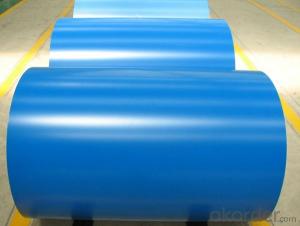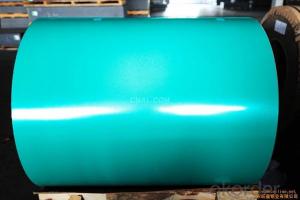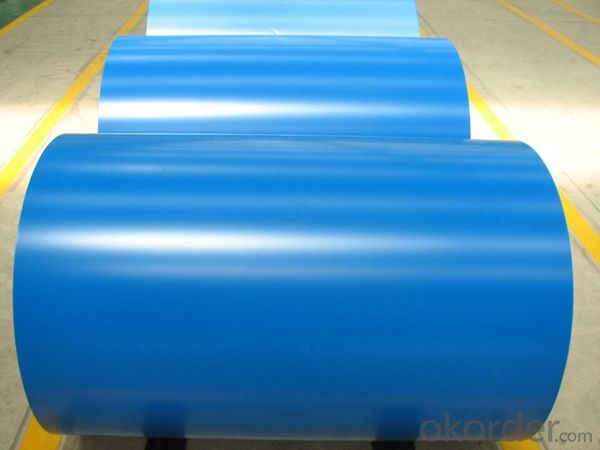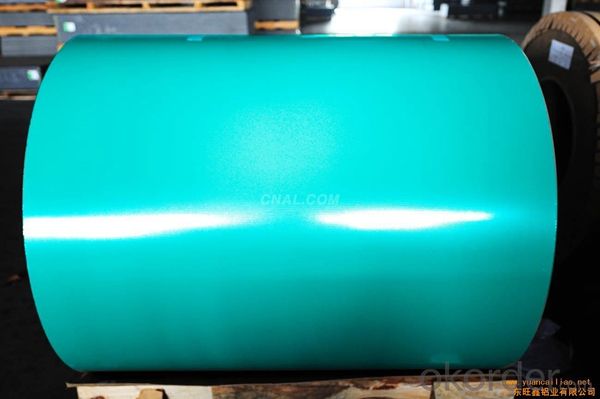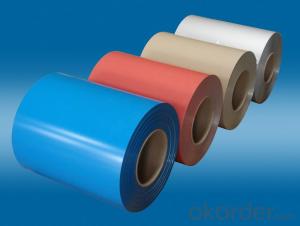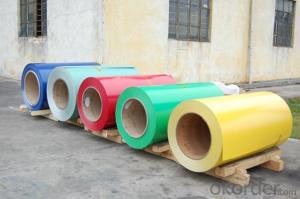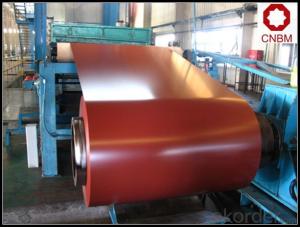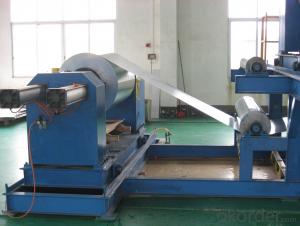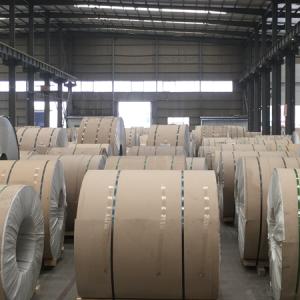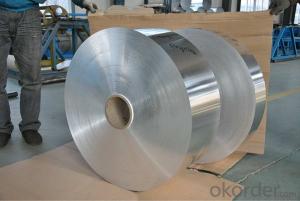5052 H32 Aluminum Alloy Coil - Blue Color Coating for Outdoor Wall System
- Loading Port:
- Shanghai
- Payment Terms:
- TT OR LC
- Min Order Qty:
- 5 m.t.
- Supply Capability:
- 10000 m.t./month
OKorder Service Pledge
OKorder Financial Service
You Might Also Like
Specification
1. Specification of Blue Color Coating Aluminum Coil for Out Door Wall System
characteristics | Application |
1) Super peeling strength | 1) Building exterior curtain walls |
2) Excellent surface flatness and smoothness | 2) Decoration and renovation additions for old buildings |
3) Superior weather, corrosion, pollutant resistance | 3) Decoration of interior walls, ceilings, bathrooms, kitchens and balconies |
4) Even coating, various colors | 4) Shop door decorations |
5) Fireproof, excellent heat and sound insulation | 5) Advertisement board display platforms and signboards |
6) Superior impact resistance | 6) Wallboards and ceilings for tunnels |
7) Lightweight and easy to process | 7) Industrial materials, materials for vehicles and boats |
2. Application of Blue Color Coating Aluminum Coil for Out Door Wall System
(1).Interior: wall cladding, ceilings, bathrooms, kitchens and balconies, shutters, doors...
(2).Exterior: wall cladding, facades, roofing, canopies, tunnels,column covers , renovations...
(3).Advertisement: display platforms, signboards, fascia, shop fronts...
3. Feature of Blue Color Coating Aluminum Coil for Out Door Wall System
*Such coil is specially designed to replace aluminum ingot, due to the high export tax of aluminum ingot, the coil has better price than ingot.
*This type of coil can fit customer's remelting furnace just like ingot, no need to make any change to the production line that was previously used for ingot. The standard coil size and weight is very suitable for the feed gate of furnace.
*This type of coil causes less material wastage than ingot when remelted.
*Our coil is made directly from ore, no need to go though the ingot making process, quality is much better than other suppliers who use ingot scrap to make coil.
Be free from Oil Stain, Dent, Inclusion, Scratches, Stain, Oxide Dicoloration, Breaks, Corrosion, Roll Marks, Dirt Streaks and other defect which will interfere with use
4. Certificate:
SGS and ROHS(if client request, paid by client), MTC(plant provided), Certificate of Origin(FORM A, FORM E, CO), Bureau Veritas and SGS (if client request, paid by client), CIQS certificate
5. Image of Blue Color Coating Aluminum Coil for Out Door Wall System
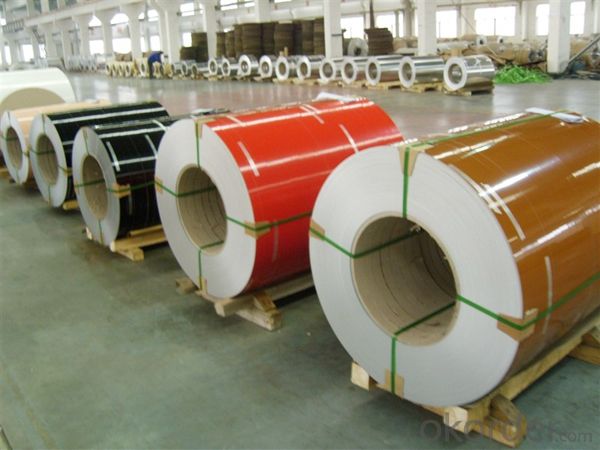
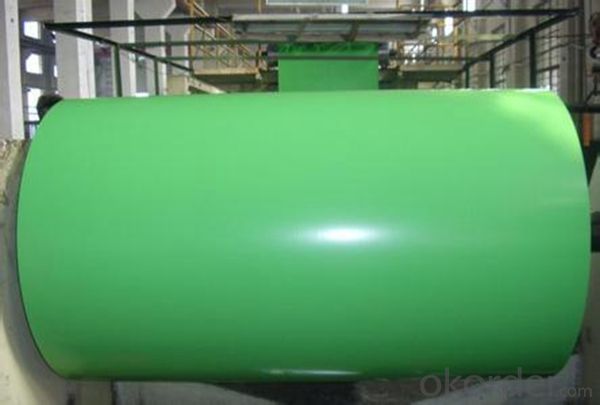
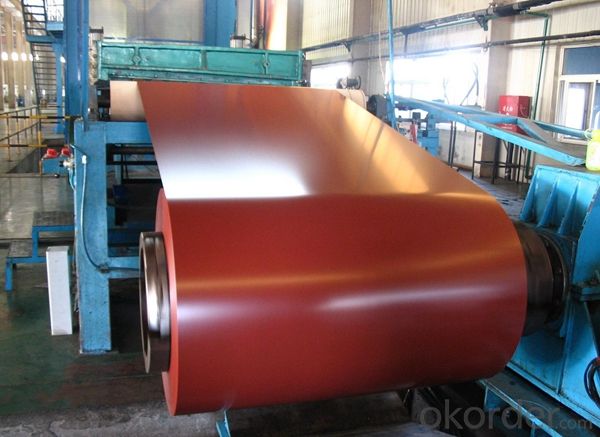
6. Package and shipping of Blue Color Coating Aluminum Coil for Out Door Wall System
eye to wall
eye to the wall
with wood pallet (wooded case also available)
7. FAQ
1) What is the delivery time?
Dpends on actual order, around 20 to 35 days
2)What is the QC system:
We have QC staff of 20 persons and advanced equipment, each production is with MTC traced from Aluminum ingot lot.
3) What market do you mainly sell to?
Australia, America, Asia, Middle East, Western Europe, Africa etc
- Q: Is it possible to use a magnet to determine if an aluminum coil has magnetic properties?
- <p>No, you cannot use a magnet to test the magnetic properties of an aluminum coil. Aluminum is a non-magnetic material, meaning it does not have magnetic properties and will not be attracted to a magnet. Magnets are used to test ferromagnetic materials like iron, nickel, and cobalt. To test for magnetic properties, you would need to use a different method, such as an electromagnetic induction test, which can detect magnetic fields generated by electrical currents in a coil.</p>
- Q: Can aluminum coils be used in the production of chemical storage tanks?
- Aluminum coils, indeed, have the potential to be utilized in the manufacturing process of chemical storage tanks. Aluminum, being an adaptable and long-lasting material, presents numerous advantages when it comes to chemical storage applications. Its resistance to corrosion renders it suitable for the storage of a vast array of chemicals. Moreover, its lightweight nature facilitates transportation and installation in contrast to materials such as steel. Furthermore, its non-magnetic properties can prove advantageous in certain scenarios. Nevertheless, it is crucial to carefully assess the specific demands of the chemicals being stored and seek advice from professionals or manufacturers to ensure that aluminum is the appropriate choice for the intended purpose.
- Q: What are the different surface treatments for aluminum coils?
- Some of the different surface treatments for aluminum coils include anodizing, painting, and powder coating. Anodizing involves creating a protective oxide layer on the surface of the aluminum, providing enhanced durability and corrosion resistance. Painting involves applying a liquid paint coating to the surface, which can provide various aesthetic options and additional protection. Powder coating is a dry finishing process where a powdered coating is electrostatically applied to the aluminum surface and then cured under heat, resulting in a durable and attractive finish.
- Q: What are the potential applications of coil-laminated aluminum coils?
- Coil-laminated aluminum coils have a wide range of potential applications in various industries. They can be used in the manufacturing of automotive parts, such as body panels and interior components, due to their lightweight yet durable nature. Additionally, they are suitable for building and construction purposes, including roofing, siding, and insulation, as they offer excellent corrosion resistance and thermal conductivity. Furthermore, coil-laminated aluminum coils find use in electrical industries for producing transformers, capacitors, and other electrical components due to their excellent electrical conductivity. Overall, their versatility and desirable properties make coil-laminated aluminum coils valuable in numerous applications across different sectors.
- Q: How are aluminum coils used in the manufacturing of appliances?
- Aluminum coils find widespread use in the manufacturing of appliances because of their unique properties and versatility. Primarily, they are employed in the production of heat exchangers, which serve as essential components in appliances like refrigerators, air conditioners, and heaters. One of the key advantages of aluminum coils lies in their remarkable thermal conductivity. This attribute enables them to efficiently transfer heat from one area to another, making them an ideal choice for applications involving heat exchange. In appliances, aluminum coils assist in the cooling or heating processes by transferring heat between the refrigerant or coolant and the surrounding air or water. Additionally, aluminum coils offer superior corrosion resistance in comparison to other metals, rendering them highly suitable for appliances that come into contact with moisture or other corrosive substances. This property guarantees the durability and longevity of the appliances, as the coils are less likely to rust or corrode over time. Moreover, the lightweight nature of aluminum coils contributes to the overall efficiency of appliances. It reduces the energy required for transportation and installation, thereby making it a more sustainable option. Furthermore, the lightweight coils allow for more compact designs, maximizing space utilization in appliances. Another advantage of aluminum coils is their malleability. They can be easily shaped and formed into various sizes and configurations, enabling customized designs that cater to specific appliance requirements. This design flexibility empowers manufacturers to create efficient heat exchangers that fit within the limited space available in appliances. In conclusion, the excellent thermal conductivity, corrosion resistance, lightweight nature, and malleability of aluminum coils make them a preferred choice for use in appliances. These properties make them particularly well-suited for heat exchangers, which play a crucial role in appliances requiring efficient cooling or heating processes.
- Q: Can aluminum coils be used in food processing or packaging?
- Food processing or packaging can use aluminum coils. Aluminum is commonly used in the food industry because of its lightweight, non-toxic, and corrosion-resistant properties. These qualities make it an ideal material for food processing and packaging. Aluminum coils are capable of producing various food packaging products like cans, lids, foils, and trays. They create a protective barrier against oxygen, moisture, and light, which help maintain the freshness and quality of food items. Moreover, aluminum coils are malleable, easy to shape, and seal, resulting in efficient and effective packaging solutions. In general, aluminum coils are highly favored for food processing and packaging due to their versatility, durability, and safety.
- Q: I heared the aluminum weakens or melts.
- Mercury readily combines with aluminium to form a mercury-aluminum amalgam when the two pure metals come into contact. However, when the amalgam is exposed to air, the aluminium oxidizes, leaving behind mercury. The oxide flakes away, exposing more mercury amalgam, which repeats the process. This process continues until the supply of amalgam is exhausted, and since it releases mercury, a small amount of mercury can “eat through” a large amount of aluminium over time, by progressively forming amalgam and relinquishing the aluminium as oxide. Aluminium in air is normally protected by a thin layer of its own oxide, which is not porous to mercury. Mercury coming into contact with this oxide does no harm. However, if any elemental aluminium is exposed (even by a recent scratch), the mercury may combine with it, starting the process described above, and potentially damaging a large part of the aluminium before it finally ends.
- Q: What are the different coil handling equipment options for aluminum coils?
- There are several coil handling equipment options available for handling aluminum coils, depending on the specific requirements and preferences of the user. Some of the common options include: 1. Coil Lifters: Coil lifters are specially designed lifting devices that can safely and efficiently handle aluminum coils. They typically consist of a set of clamps or hooks that securely hold the coil and are attached to a lifting mechanism. Coil lifters can be manually operated or powered by electricity or hydraulics, providing ease of use and increased productivity. 2. Coil Tippers: Coil tippers are used to rotate or tilt aluminum coils to facilitate loading, unloading, or positioning. They are typically equipped with adjustable arms or clamps that hold the coil in place during rotation. Coil tippers can be controlled manually or using hydraulic or electric systems, allowing for precise and controlled movements. 3. Coil Cars: Coil cars are specially designed transport vehicles that are used to move aluminum coils within a manufacturing facility or between different areas. They are equipped with a platform or carriage on which the coil is placed, and can feature various mechanisms for loading, unloading, and positioning the coil. Coil cars can be manually operated or powered by electricity or hydraulics for increased efficiency. 4. Coil Turnstiles: Coil turnstiles are used to safely and efficiently store and retrieve aluminum coils in a vertical position. They typically consist of a rotating drum or spool that can hold multiple coils, allowing for easy access and retrieval. Coil turnstiles can be manually operated or powered by electricity or hydraulics, providing quick and convenient storage solutions. 5. Coil Cradles: Coil cradles are used to support and protect aluminum coils during storage or transportation. They typically consist of a sturdy frame or structure with adjustable arms or supports that securely hold the coil in place. Coil cradles can be customized to accommodate different coil sizes and weights, ensuring safe and stable handling. Overall, these coil handling equipment options provide various solutions for efficiently and safely handling aluminum coils, helping to streamline manufacturing processes and improve productivity. The choice of equipment would depend on factors such as the size and weight of the coils, the specific requirements of the operation, and the available budget.
- Q: Can aluminum coils be used for electrical applications?
- Aluminum coils can indeed be utilized for electrical purposes. The electrical industry extensively employs aluminum due to its superb conductivity, lightweight nature, and resistance to corrosion. Various electrical applications, such as transformers, motors, generators, and inductors and solenoids, commonly employ aluminum coils. These coils possess advantages like high thermal conductivity and minimal eddy current losses, which make them highly efficient in the transmission and distribution of electrical power. Moreover, aluminum coils are more cost-effective when compared to copper coils, making them the preferred choice for numerous electrical applications. Nevertheless, it is worth noting that aluminum possesses lower electrical conductivity than copper. Therefore, adjustments in the coil design and dimensions may be necessary to ensure optimal performance.
- Q: I have heard that aluminum may be a contributing agent in causing Alzheimer's disease, and that if we drink from aluminum cans, that we get aluminum into our system from them. It seems like this would be pretty easy to test in a laboratory, whether or not there are aluminum particles in the contained beverage. But I have heard or read that the inside of the cans are coated with something. So is this just typical uninformed rumors from the Internets, or is there anything to it? Hate to sound rude, but I am not really interested in opinions, like Well I don't think they would sell them if... or Oh yes, I think you get lots of aluminum from it. I am only interested in facts, not gut feelings or opinions.
- I recently covered this in a materials science class I am taking. My professor is Dr. Han Choo. Most aluminum cans have a coating of epichorohydrin. This is not to keep out the aluminum from the drink, but rather it is meant to keep the drink from reacting with the can(many sodas can actually eat through metal). The reaction of the soda with the can ruins the taste which is obviously something soda companies do not want. Aluminum also does not cause Alzheimer's. The metal is considered poisonous in large quantities and the FDA restricts the amount that can be added to drugs, food, drink, etc., but scientific consensus states that there is no link between Alzheimer's disease and aluminum. As far as BPA(Bisphenol A) health concerns go, there is little evidence proving any real harm to adults. The problems are only seen in offspring of the rodents being tested with BPA. For the most part there is little concern about the negative results of BPA exposure. There has not been any clear links in humans yet either. Extensive testing is still being done and BPA might be marginally dangerous to infants, but I wouldn't worry about it too much. If you still wish to guard yourself against BPA you should be aware that BPA is used in almost all commercial plastics and can liners(bottles, canned food, food storage containers, etc.) not just in aluminum cans.
Send your message to us
5052 H32 Aluminum Alloy Coil - Blue Color Coating for Outdoor Wall System
- Loading Port:
- Shanghai
- Payment Terms:
- TT OR LC
- Min Order Qty:
- 5 m.t.
- Supply Capability:
- 10000 m.t./month
OKorder Service Pledge
OKorder Financial Service
Similar products
Hot products
Hot Searches
Related keywords
